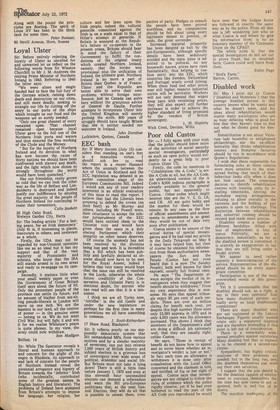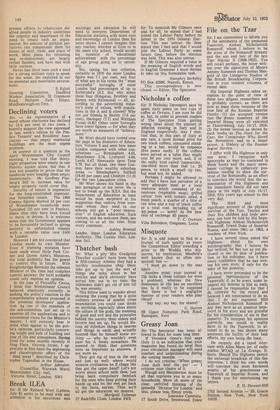Disabled work
Sir: May I point out to Custos (' Disabled and Homeless ') that the average disabled person in this ; country knows what he wants and what he doesn't want, and his ; ideas about rehabilitation would startle many sociologists who are so busy debating what is good for him that they haven't time to find out what he thinks good for himself.
Rehabilitation is not about Victo rian lady bountiful or enlightened philanthropy, nor the ex-officer mentality that thinks rehabilitation centres and Remploy factories should be run in accordance with Queen's Regulations.
I wish that those responsible for formulating rules at those centres were more sensitive to the widespread feeling that much of their behaviour looks silly when it does not look unjust. The conscious decision to identify rehabilitation centres with training units by installing timeclocks, limiting the workshop seating arrangements, refusing to allow overalls in the canteens and the holding of pay parades is open to challenge. The distinction between rehabilitation , and industrial training should be revised and made more precise.
Disability creates a number of , different hardships. Allied with loss of employment is loss of , status, Politically, we are a democracy; industrially, as far as the disabled person is concerned, it is scarcely an exaggeration to say that they are still living under a feudal system.
We appear to need rather urgently a democratisation of the , service. Representatives of the disabled should be on every appropriate committee.
Participation is one of the most overworked words of this generation.
Yet is it unreasonable that the disabled should ask, as a right, a say in their own interests? Just how many disabled persons actually serve on local disablement committees?
There are many disabled who are not registered at the Labour Exchanges. Figures usually quoted relate only a registered disabled and are therefore misleading if this point is left out of consideration. There is a remarkably widespread prejudice against registering Many disabled feel that to register is to be classed as a second-rate citizen. ym p
S
ym p
athetic, but highly critical analyses of their problems are, needed; but in the long run, onIN, the disabled themselves can world out their own salvation.
I suggest that the aim should bc for the disabled capable of employ ment to convince themselves that the time has now come to get or ganised, both in and out of in d u s threy
manifest inadequacy of th present efforts to rehabilitate disabled people in industry underlines the urgency and importance of the need to create such an organisation. No amount of political palliatives can compensate them for losses of skill, trade, and place of work. Most plans for retraining and re-deployment, are largely verbal facades, and have met with little success.
Never has there been such a need for a strong militant voice to speak for the weak, the exploited in our im-personal and materialist environment.
S. Rylatt Steering Committee, Disabled Worker Association, 32 Cranmore Road, Pallister Park Estate, Middlesbrough-on-Tees.











































 Previous page
Previous page